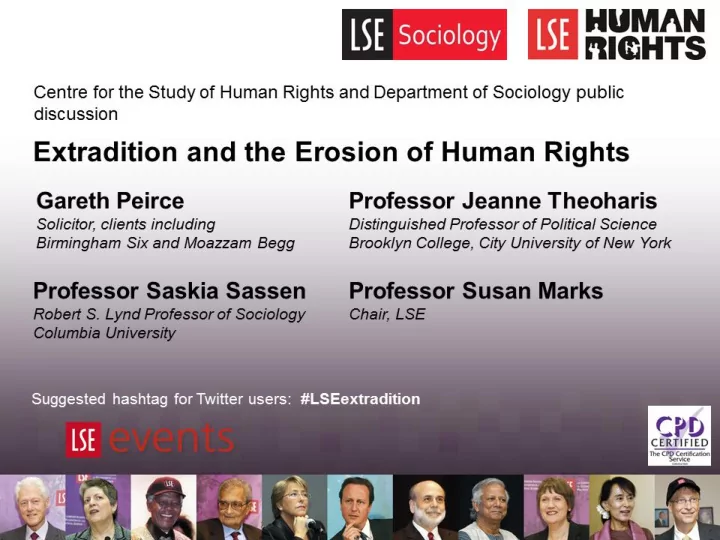

LOSING RIGHTS saskia sassen Columbia University www.saskiasassen.com For elaboration on some of this material see the author’s Expulsions: Brutality and Complexity Harvard University Press/Belknap 2014 .
Map of government and private surveillance agencies in the US Source: Washington Post. 2010. “Top Secret America,” Interactive Maps. Washington Post , July 2010. http://projects.washingtonpost.com/top-secret-america/map/
, • In Washington and the surrounding area, 33 building complexes for top-secret intelligence work are under construction or have been built since September 2001. – Together they occupy about 17 million square feet – the equivalent of almost three Pentagons or 22 US Capitol buildings. •
US Surveillance and Intelligence Agencies .
The Black Budget • US funding for the National Intelligence Program’s agencies totaled $52.6 billion 2014 • The top 5 spending agencies are 1. Central intelligence Agency 2. National Security Agency 3. National Reconnaissance Agency 4. National Geospatial-Intelligence Program 5. General Defense Intelligence Program The Washington Post: http://www.washingtonpost.com/wp-srv/special/national/black-budget/
Spending mostly goes towards Spending mostly goes towards 1. Data collection 2. Data analysis 3. Management 4. Facilities and support 5. Data processing and exploitation And targets 5 objectives • Warning U.S. leaders about critical events ($20.1 billion) • Combating terrorism ($17.2) • Stopping spread of illicit weapons ($6.7) • Conducting cyber operations ($4.3) • Defending against foreign espionage ($3.8)
• ACLU compiled a report of incidences where individuals/groups’ first amendment rights have been infringed upon by law enforcement agencies in 36 states • https://www.aclu.org/maps/spying-first-amendment-activity-state-state
.Who is dangerous Department of Homeland Security issued warnings against: • Veterans: right-wing extremists might recruit and radicalize "disgruntled military veterans." • Environmentalists: "mainstream organizations with known or possible links to eco-terrorism .” • Nation of Islam: sent a report titled “ Uncertain Leadership Succession Poses Risks” FBI • Improperly spied on American activists involved in First Amendment-protected activities • Listed the Green Party as potential future target of eco- terrorism investigation.
What We Know the NSA Can Do ....So Far thank you: Jody Avirgan; E.Snowden's Docs
. • It can track the numbers of both parties on a phone call, + location, time and duration. (More ) • It can hack Chinese phones and text messages. (More) • It can set up fake internet cafes. (More) • It can spy on foreign leaders' cell phones. (More ) • It can tap underwater fiber-optic cables. (Clarification: Shane Harris explains that there were reports the NSA was trying to tap directly into cables using submarines, but is now more likely trying to intercept information once it has reached land.) (More) • It can track communication within media organizations like Al Jazeera. (More) • It can hack into the UN video conferencing system. (More) • It can track bank transactions. (More) • It can monitor text messages. (More) • It can access your email, chat, and web browsing history. (More) • It can map your social networks. (More) • It can access your smart-phone app data. (More)
. • It is trying to get into secret networks like Tor, diverting users to less secure channels. (More) • It can go undercover within embassies to have closer access to foreign networks. (More) • It can set up listening posts on the roofs of buildings to monitor communications in a city. (More) • It can set up a fake LinkedIn. (More) • It can track the reservations at upscale hotels. (More) • It can intercept the talking points for Ban Ki- moon’s meeting with Obama. (More) • It can crack cellphone encryption codes. (More) • It can hack computers that aren’t connected to the internet using radio waves. (Update: Clarification -- the NSA can access offline computers through radio waves on which it has already installed hidden devices.) (More) • It can intercept phone calls by setting up fake base stations. (More) • It can remotely access a computer by setting up a fake wireless connection. (More)
. • It can fake a USB thumb drive that's actually a monitoring device. (More) • It can crack all types of sophisticated computer encryption. (Update: It is trying to build this capability.) (More) • It can go into online games and monitor communication. (More) • It can intercept communications between aircraft and airports. (More) • It can physically intercept deliveries, open packages, and make changes to devices. (More) (h/t) • It can tap into the links between Google and Yahoo data centers to collect email and other data. (More) (h/t) It can monitor, in real-time, Youtube views and Facebook "Likes." (More) • It can monitor online behavior through free Wi-Fi at Canadian airports. (More)
. • It can shut down chat rooms used by Anonymous and identify Anonymous members. (More) • It can use real-time data to help identify and locate targets for US drone strikes. (More) • It can collect the IP addresses of visitors to the Wikileaks website. (More) • It can spy on US law firms representing foreign countries in trade negotiations. (More) • It can post false information on the Internet in order to hurt the reputation of targets. (More) • It can intercept and store webcam images. (More) • It can record phone calls and replay them up to a month later. (More) • It can harvest images from emails, texts, videoconferencing and more and feed it into facial recognition software. (More)
just now • A new European commission counter-terror plan will require the blanket collection and storage for up to five years of personal data records of all passengers flying in and out of Europe • breaches a recent European court of justice ruling that blanket collection of personal data without detailed safeguards is a severe incursion on personal privacy.
Recommend
More recommend